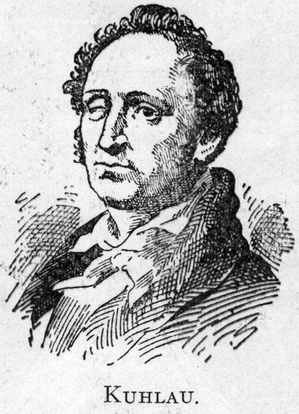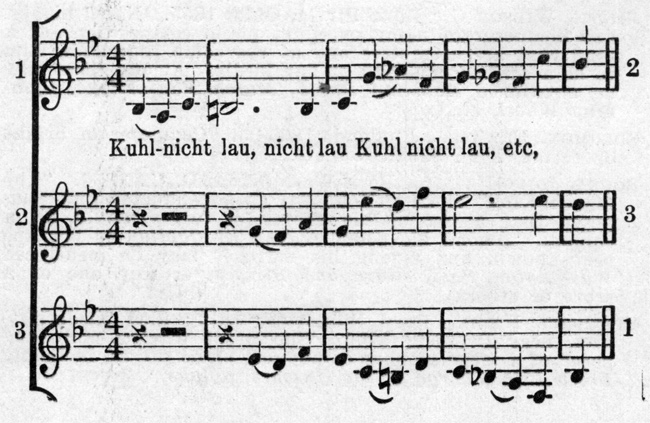 The sonatinas of Kuhlau have done so much to help us along in our work as piano students or teachers that it is rather surprising that more is not known of their composer. For Kuhlau was no mean figure in the musical world of his day, and rose from the deepest poverty (he sang in the streets for a living at one time) to a post of great distinction. He also enjoyed the friendship of many prominent people, musicians and otherwise, not least of which was that of Beethoven himself.
The sonatinas of Kuhlau have done so much to help us along in our work as piano students or teachers that it is rather surprising that more is not known of their composer. For Kuhlau was no mean figure in the musical world of his day, and rose from the deepest poverty (he sang in the streets for a living at one time) to a post of great distinction. He also enjoyed the friendship of many prominent people, musicians and otherwise, not least of which was that of Beethoven himself.
Frederick Daniel Rodolphe Kuhlau was born 1786 at the little village of Luneburg, Hanover. When he was still a small boy his mother sent him to the fountain for water one dark night, and as he stumbled through the gloom he fell, with the result that he injured one of his eyes. Subsequently he lost the sight of the injured member, and was thus placed in the position of Otto Sevcik in our own day. This did not prevent him from studying music, however, and in spite of the poverty of his parents he learned to play the flute and the piano, besides several other instruments. This was in Brunswick, while he attended a singing-school. It was here that he had to sing in the streets for a living. Later he drifted to Hamburg and managed to have a few lessons in harmony with Schwenke.
Those days, like our own, were troublous, and the continent was alive with troops of Napoleon and his enemies. In order to escape conscription, Kuhlau went to Copenhagen, where peace still reigned. Here he became first flutist in the band of the king of Denmark, and soon rose to high favor. He bought a house at Lyngbye, near Copenhagen, and gave lessons in piano and theory. He also took a great interest in restoring the National Opera, and himself wrote many operatic works, the most important of which were the Castle of the Brigands (1814), Eliza, Lulu, The Magic Harp, Hugo and Adelaide, etc. In 1818 Kuhlau was made Court Composer (with a salary which had previously been omitted) and ten years later he was accorded the title of “Professor.” This he thoroughly deserved, as he possessed great skill as a contrapuntist. It is said that he used to exchange “puzzle canons” with his contrapuntal friends, in which they set each other various canonic enigmas to solve.
In the autumn of 1825, Kuhlau visited Vienna and spent a lively day with Beethoven, who then lived at Baden, close by. The two friends and some other congenial spirits had a picnic in the open, at which, inspired by good cheer, Kuhlau and Beethoven vied with each other in improvizing canons. Beethoven, however, was not satisfied with his improvizations and next morning sent the following letter to Kuhlau, in which it will be seen that in the matter of prohibition, Beethoven agrees, to a certain extent at any rate, with Secretary Daniels, of the United States Navy Department :
Baden, 3 September, 1825.
I must confess that the champagne got too much into my head last night, and has once more shown me that it rather confuses my wits than assists them; for though it is usually easy enough for me to give an answer on the spot, I declare I do not in the least recollect what I wrote last night. Think sometimes of your most faithful Beethoven.
Accompanying the letter was the canon to which Beethoven had found the answer. It is given below together with the punning words on the name Kuhlau which make it characteristic of Beethoven. The first four notes of the theme, it will be observed, are BACH (H being in Germany equivalent to B natural).

Unhappily Kuhlau’s house was burned down in 1830 and many manuscripts which he valued highly were destroyed. Shortly after, both his parents died. Crushed with these misfortunes, he himself passed away in March, 1832. His burial was attended with much pomp and circumstance, a funeral march of his own being played and numerous services held.
Kuhlau’s piano works have been found invaluable as an introduction to the sonatas of Haydn, Mozart and Beethoven, for though they lack the inspiration of genius, they are very melodic and admirably put together. Perhaps Kuhlau’s chief claim to greatness is found in his works for the flute, which are among the most important for that instrument, and have earned him the rather absurd title of “the Beethoven of the flute.” These works comprise flute solos, duets, trios, and even quartets, as well as works for the flute in combination with other instruments. The influence of the flute is quite evident in his piano works which abound in charming passages in the higher octaves of the piano. It is also noticeable in the flowing style of his music—a style peculiar to composers who are accustomed to play on an instrument capable of sustaining long voice-like tones, and at the same time capable of great flexibility.



